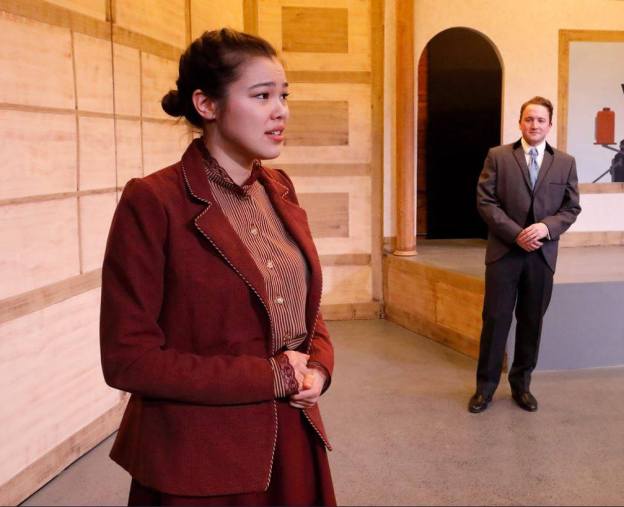Russ Farmer as Bobby, Emily Smith as Marta. Photo credits Nanc Price.
Stephen Sondheim’s 1970 musical Company shows us a group of friends in their 30s, five married couples and the single guy, Bobby (Russ Farmer in the current Foote in the Door production).
In a series of gentle vignettes, we see glimpses of each couple’s relationship and challenges. We see that Bobby is friends with everybody, good company, as he spends time with each couple. Harry and Sarah (Stefan Rumak and Melanie Lafleur) talk to Bobby as a way of complaining about each other’s habits (his drinking, her eating sweets). He’s best man for Paul and Amy’s (Alan Cabral and Ruth Wong-Miller) wedding – or he would be, if they agree to get married. Joanne (Kärin Thomas) enjoys flirting with Bobby and telling him about her past husbands while devoted present husband Larry (Joe Garreck) looks on. Susan and Peter (Athena Gordon and Trevor J.) explain to Bobby that being divorced makes their marriage work. Bobby smokes weed with David and Jenny (Simon Yau and Kara Little). All of them fuss at Bobby about not being married and try to find out why he’s not married – and Bobby doesn’t seem to know either.
We also see Bobby with three love interests, naive flight attendant April (Victoria Suen, whom I last saw in Lizzie), Kathy, who’s moving away but says she would have liked to marry him (Alyssa Paterson), and Marta (Emily Smith), one of my favourite characters, who is wholeheartedly in love with New York City and with life.
And I should mention that it was fun to spot assistant director Gerald Mason playing bartender and what seemed to be a nightclub full of show orchestra members and assistant stage managers dancing in the dark.
It wasn’t the plot-heavy kind of production full of big character journeys and closure, but rather was full of lovely examples of longterm love and friendship and of people accepting who they are and being comfortable. My favourite part was “Getting Married Today” in which Ruth Wong-Miller’s character has hilarious physical and emotional range in a wedding dress. I also enjoyed “Side by Side by Side”, which was a great showcase of choreographer Adam Kuss’s contributions, and Bobby’s final solo “Being Alive”. There are also many other touching and/or delightful moments which I won’t tell you about so you can discover them for yourself, with just one hint: Trevor J. lets his hair down.
I admired how Morgan Kunitz’ direction integrated everyday smartphone use into a script from 1970 without looking anachronistic.
Company is playing at L’UniThéâtre until April 28th. And if you haven’t been to the big auditorium at La Cité yet this season, you will be pleasantly surprised by the new audience seating, which is much more comfortable than the previous seats.





